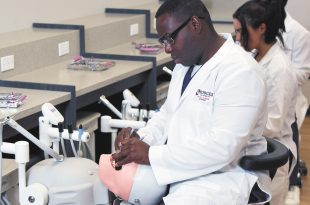Skin cancer, which is the most common form of cancer in the United States, is the result of the abnormal growth of skin cells. Cancer can affect skin anywhere on the body but most frequently appears on skin that is exposed to the sun. There are more than a million new cases of skin cancer in the United States each …
Read More »Charlotte Edition
Purple Tea… For Women of Color… Every Color!
Accounting for an estimated 30 percent of new cancer cases in women each year, breast cancer has impacted more than 3.8 million women in the United States. Those who have not been diagnosed are considered at average risk, about 13 percent or 1 out of 8 women. However, family history, race, ethnicity, and genetics can increase your risk of breast …
Read More »FEBRUARY IS AMERICAN HEART MONTH – Heart Failure
By Dr. Aneley Yegezu Hundae, M.D., FACC Heart failure is a condition where the heart doesn’t meet the body demand in pumping adequate blood. This leads to several symptoms and signs as well as various laboratory abnormalities. The most common presentation is from fluid build up in the body leading to; shortness of breath, leg swelling, weight gain, inability to …
Read More »How Does Companion Care Work?
By Afton Patterson Companion care is a type of in-home care that provides socialization, emotional support, and assistance with daily activities for individuals who may be living alone or have limited mobility. This type of care is designed to help seniors, people with disabilities, and those recovering from an illness or injury to maintain their independence and quality of life. …
Read More »Cosmetic Spider Vein Removal
By Joyce Vein & Aesthetics Institute Spider veins (telangiectasia) are damaged, visible blood vessels just beneath your skin’s surface. They typically look red, blue or purple. They may appear in clusters that resemble spider webs or tree branches. Spider veins can form anywhere, but they usually develop in your legs or face. Many of us will eventually encounter vein health …
Read More »LASIK – All You Ever Wanted to Know
LASIK is a quick and painless procedure that can give you long-lasting vision without glasses or contact lenses. That’s why, since its introduction more than 25 years ago, millions of Americans have turned LASIK for correcting nearsightedness, farsightedness and astigmatism and giving them visual freedom. The LASIK team at Quigley Eye Specialists consist of a dedicated LASIK staff as well …
Read More »FEBRUARY IS TINNITUS AWARENESS MONTH!
By Dr. Noël Crosby, Au.D. Tinnitus is the perception of a sound that has no external source. Some of the more common sounds reported are: ringing, humming, buzzing, and cricket-like. It can also be a combination of sounds, and for many, the sound of their tinnitus actually changes. It can be constant or intermittent and is heard in one ear, …
Read More »32 Reasons a Dental Hygienist Helps Your Smile
By Dr. Susan Anderson, Program Director, Dental Hygiene Program at Hodges University As an adult, we have 32 teeth that together make up our smiles, and help us enjoy life. February is Dental Hygiene Month, and your dental hygienist is a key in helping you keep your smile through your life. The American Dental Association recommends getting your teeth cleaned …
Read More »Checking your Sexual Health in Time for Valentine’s Day
By Brianna Vance Fago, AGNP-BC and Nicole Burns, DO Sexual dysfunction can take many forms — it’s not limited to erectile dysfunction or lack of interest in sex, often referred to as a low libido. It can involve pain during intercourse, an inability to maintain an erection, or difficulty experiencing an orgasm. Though there are many causes of diminished libido …
Read More »Cervical Cancer Prevention & the HPV Vaccine
By Dr. Amy Fox January is Cervical Cancer Awareness month. Cervical cancer is a risk for all women, with about 13,000 new cases reported in the United States each year. While cervical cancer usually occurs in women over 30, prevention can begin as early as age 9 the human papillomavirus (HPV) vaccine. Almost all cervical cancers are caused by HPV. …
Read More » Southwest Florida's Health and Wellness Magazine Health and Wellness Articles
Southwest Florida's Health and Wellness Magazine Health and Wellness Articles







